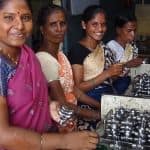Social Enterprise’s Achilles Heel: How the Information Deficit Limits Scale and Impact in India
On May 11, Michael Dell pledged an additional $1 billion to the endowment of his Michael and Susan Dell Foundation (MSDF). This comes close on the heels of Ford Foundation’s commitment of $1 billion for mission-related investments.
A significant chunk of both the commitments has been earmarked for emerging markets/social entrepreneurship in India for MSDF, and access to financial services in emerging markets for Ford.
However, the pace at which money is slated to pour into these markets hasn’t been matched by information and knowledge flows. While academic writing around social entrepreneurship has risen exponentially in the West, the same has not been true for Africa, Latin America and India.
According to a study by Villgro, “there are but a handful of scholars in India working on social entrepreneurship and social innovation and while this is growing, it is incommensurate with the growth in the field as well as the need for a more plural understanding of the phenomenon in India.”
The gap is not limited to academic writing. Also missing is the access to strategic and actionable insight on diverse business models, innovative approaches and lessons learned. And while investing scarce resources to the creation and dissemination of knowledge might seem less important than focusing on the social business itself, its absence can actually impede impact at all levels – community, organisational as well as national.
A lack of information slows the pace and scale of impact
When information is limited or hard to get to, social enterprises run the risk of always having to start from scratch. This reinventing the wheel cuts across the business problems they might face: What are the peculiarities of the new geographies that one is expanding into? What do customers want versus what they need? How does one convert the number of people reached into products and services sold? What are the specific barriers to scale with respect to last-mile distribution? The list goes on.
More importantly, the absence of readily available information on similar enterprises, analogous business models and complementary products and services results in a waste of time, talent, expertise and money in what is already a resource-constrained sector.
“This is a problem I routinely encounter, both in my role as an entrepreneur and as an investor in this space in India,” says Shloka Nath, a development sector expert and angel investor.
Nath also co-founded a gender-lens focused impact investment fund and says the lack of access to credible and timely information “created far more risk on the investment side. Not having enough information means you are more constrained than you need to be in assessing the viability of startups. It isn’t encouraging more lending, which a growing market like India needs.”
On the flip side, the presence of relevant knowledge allows for partnerships to be formed, which in turn can help access new markets, understand communities and fast-track scale.
Context-specific solutions require context-specific information
As the Villgro study suggests, information is currently being created on a global scale that is relevant to people working on social challenges. However, when it comes to impact, context is everything. Research and practice in the sector have shown that solutions from one part of India do not necessarily work in another part of the country. Can we then expect knowledge created in the West to fill the gaps we have here?
Social businesses do not exist in a vacuum. In most cases, they are highly dependent on their political, financial and social environment for success. They need favourable laws, innovative financing mechanisms, access to public goods and infrastructure, and industry facilitators in order to achieve their double bottom line goals of social impact and economic returns.
But this is near impossible to achieve unless governments, banks and financial institutions, impact investors and corporate partners actually understand their business models, their interlinkages with industry and society, and their potential for large-scale impact.
Getting knowledge out of silos
The absence of available knowledge became apparent through our research and our conversations with leaders working in the social impact space. They highlighted that while the development community in India has vast expertise and wisdom on advancing social change, that knowledge often stays in silos, is locked in people’s heads or buried within organisations. This limits the overall potential of the sector and what we can achieve through our programmes and money.
We realised very quickly that India lacked a platform that adequately served the information needs of decision-makers in the development sector. To address this gap, we founded India Development Review, an independent online media platform that surfaces these ideas, experiences and practices, and reflects the diversity, complexity and inventiveness of the sector.
Our mission is to advance knowledge on social impact in India, and in so doing, highlight voices on issues that matter and feature successes, and more importantly, failures.
To do our mission justice, we need to hear from you on what you would like to read. Visit our website, email us feedback or tweet at us – we want to learn from you.
Devanshi Vaid oversees outreach, dissemination, audience growth, user engagement and media partnerships at India Development Review.
Photos courtesy of Charlotte Anderson Photography
- Categories
- Education



